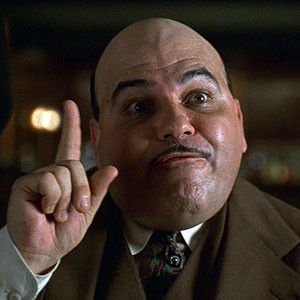 At the start of the Coen Brothers 1990 film Miller’s Crossing, the character of Johnny Caspar can be heard offscreen, pleading a case to mob boss Leo: “I’m talking about friendship. I’m talking about character. I’m talkin’ about–hell, Leo, I ain’t embarrassed to use the word–I’m talking about ethics.” Caspar is complaining about a character named Bernie profiting off his expense, and because of this breach of ethics, Caspar wants Leo’s permission to kill Bernie.
At the start of the Coen Brothers 1990 film Miller’s Crossing, the character of Johnny Caspar can be heard offscreen, pleading a case to mob boss Leo: “I’m talking about friendship. I’m talking about character. I’m talkin’ about–hell, Leo, I ain’t embarrassed to use the word–I’m talking about ethics.” Caspar is complaining about a character named Bernie profiting off his expense, and because of this breach of ethics, Caspar wants Leo’s permission to kill Bernie.
The mobsters in Miller’s Crossing have Leo to appeal to for justice. Retrogamers have Internet forums.
This article is about reselling retro videogames, a practice that can be regarded to be as unethical as blowing the fix on a prizefight. In other words, some people believe that there is a right way and a wrong way to sell retro videogames. I am not talking about the ethics of capitalism here, whether it is right or wrong to own the means of production and to profit from the labor of others. Rather, I am interested only in the ethics of reselling retro videogames. For the purposes of this article, I am defining reselling as the purposeful buying of retro videogames for selling them later at a profit. Some call this practice “flipping,” while others draw a distinction between flipping and reselling. When I unscientifically polled the members of Atari Age’s forum on the topic, I discovered that almost half of the people thought that there was something wrong with this practice.
[These numbers are current as of the writing of this article, but the poll is still live, as is the thread on the forum, both of which can be accessed by clicking here.]
Why Do People Care?
In one word, eBay. To many retro videogame collectors, the combination of a reselling culture and the world’s largest online market for reselling spells disaster. Because of its influence, eBay is not only an online shopping site: it can actually set the value for collectibles. Retail store owners, Goodwill, and even garage salers have calibrated their price guns to the going rate on eBay. And if this does not happen, resellers will cherry pick through goods as soon as they are set out with the sole intent of listing them on eBay. Some of the respondents longed nostalgically for the days of thrifting before the rise of eBay. Without eBay, resellers would be confined to swap meets and Craigslist and would not wield the global influence over retro videogame values that they might now.
Those who expressed reservations about reselling shared a common objection: reselling is bad because it artificially inflates prices on eBay. Resellers may go “fishing” by listing items at inflated prices hoping that inexperienced or impatient collectors will pay more what the item is worth (as established by previous sales on eBay). If these buyers do get “hooked,” then a new floor has been set for the value of an item–one that has been artificially determined by the reseller. The value is artificial because the reseller either sets a high starting bid or “Buy It Now” price without allowing a traditional auction with a low starting bid to set value. Collectors may have even more disdain for these resellers if they are not gamers and/or do not “give back” to the hobby and only exploit it for their personal gain.
Another objection is that resellers may price items for much more than what they paid for them. How would a person know this? If the item is purchased on eBay, a dedicated sleuth can track a reseller’s buying history via that person’s feedback page. After that point, the detective work boils down to comparing photographs. Resellers can be seen as preying on naive sellers who set a low “Buy It Now” price or are coerced into adding a “Buy It Now” price to an auction-style listing. On much rarer occasions, a person will resell an item acquired via Atari Age’s Marketplace forum. Some members frown on this practice even more severely because it appears to abuse the tacit agreement between collectors that the items will stay in personal collections.
As well, the issue can be one of fair access to new products, not just vintage products. The new products I’m talking about are homebrew games released in limited, small quantities by individuals and small businesses. Some games are made in batches as low as 50. Resellers will buy multiple copies of a homebrew game, perhaps keeping one for a personal collection and saving the rest for resale or trade. When a title goes out of print, prices rise, and new collectors may be shut out of the market because of the inflated prices. Homebrew games that originally sold for $50 have been resold on eBay for two or three times that amount, sometimes much more. Producers of these homebrew games do not usually mind one person buying multiple copies, however, for obvious reasons, but again, may regard the level of markup as extreme or the reseller as greedy.
When Is It Okay to Resell?
The majority of respondents believed that a person should be able to sell anything they own for whatever the market will bear. They may or may not believe that reselling is even an ethical issue: if people legally acquired goods, they have the right to sell them at whatever price they set. However, many who felt this way were of the opinion that this practice was “distasteful,” albeit not unethical. Even so, a healthy proportion of respondents were willing to set conditions for reselling.
When eBay did not play a role in the acquisition of goods, respondents were much more comfortable with reselling, even on eBay. For example, respondents generally had no issue with people reselling items that they had purchased at garage sales or thrift stores. Part of the reason here may be the credit given to an old-fashioned work ethic: resellers did the legwork, using their own time to paw through thrift store detritus, taking a risk that the goods they purchased may or may not be in working order. A more compelling reason for some is that resellers are “saving” retro videogames from garage salers and thrift stores that would toss them in the garbage or recycling if they did not sell. If a copy of Lochjaw sells for 1,000x the reseller’s purchase price, well, that’s still better than it ending up in the landfill. Lastly, some members said that hunting for retro videogames in the “wild” was one of the ways they have fun, and they would buy any bargain-priced rarity regardless of their need for it (probably to resell) because that was part of the hunt, if not the most important part.
Resellers also got a pass if they bought a lot for one item needed for a collection and resold the rest. This exception is related to the “giving back to the hobby” issue described above; here, the reseller is a gamer and collector, so he or she is not motivated by greed alone. In fact, many justified this practice by saying that it was a big reason why they have been able to amass the collection that they now own. This kind of reselling is seen as more ethical because the profits are earmarked to be plowed back into the hobby. A majority of members stated that they have resold this way and will continue to do so.
Some people resell retro videogames because of financial need. One respondent who makes a living reselling retro videogames explained that those who have criticized him as opportunistic and greedy do not know how much work is involved with selling full-time. Again, the perceived labor cost of reselling mitigates against much disapproval. From time to time, a member must sell a collection in part or in whole because of life’s other needs, and in these cases members generally have no problem paying fair market value (or even above) to help out a fellow collector.
Finally, there is a version of reselling that many do not even regard as reselling. It is called trading. For those who regard reselling as an ethical issue, trading is generally seen as being a more ethical practice than reselling. For example, a collector may purchase multiple copies of a homebrew game not to resell but to trade to other collectors at a later time. For some, it makes a difference that actual money does not change hands, although the item might still be traded at fair market value rather than at purchase price, making the distinction between trading and reselling murkier. Trading adds a personal element to the exchange because both parties have a better idea of who is getting the item and what will happen to it, making it less likely that the item will become part of the resale market.
It’s Not Going Away
Resellers will be a part of any community of collectors. What makes retrogaming somewhat unique in this regard is that retro videogames have become collectible relatively recently, only in the past 15-20 years, unlike other collectibles such as toys, automobiles, comic books, etc. Members can still remember when people couldn’t give away consoles and games, or when you could find them for next to nothing at thrifts and garage sales. So the level of disapproval may be more intense now only because the community hasn’t settled into the “new normal” culture wherein we expect these items to command high prices, resellers are just “sellers,” and members are more content to stare at their collections than to play them.
If there’s any single conclusion to be drawn from the discussion on Atari Age, it is that resellers are given more respect if it is publicly known that they are also gamers and active members of the retrogaming community. I hope that feeling lasts as long as possible. Please check out the link to the thread above and feel free to contribute your opinions to it.















Discussion
No comments yet.